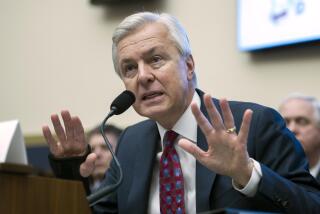Whoa, Fannie Mae
The Feds are on to Fannie Mae. The giant mortgage finance company now stands accused by the Securities and Exchange Commission of playing fast and loose with accounting standards and could be forced to book $9 billion in losses on derivatives trading. This embarrassment finally could embolden Washington to put an end to an even bigger scam -- the implicit subsidy Fannie Mae gets from taxpayers.
For starters, Congress can now be expected to create a new regulatory agency capable of riding herd on this company -- and its sibling Freddie Mac -- which has strayed from its mission of lowering homeownership costs. That will mean standing up to Fannie Mae’s powerful lobbyists. It’s also worth asking whether Fannie Mae can break with the past if the architects of its self-serving business plan -- Fannie Mae Chairman and Chief Executive Franklin D. Raines and Chief Financial Officer Timothy Howard -- remain in control.
For the record:
12:00 a.m. Dec. 20, 2004 For The Record
Los Angeles Times Monday December 20, 2004 Home Edition California Part B Page 10 Editorial Pages Desk 1 inches; 38 words Type of Material: Correction
Freddie Mac -- An editorial Friday on mortgage finance company Fannie Mae mistakenly stated that accounting irregularities had forced its sibling, Freddie Mac, to report a $5-billion loss. Actually, it made an upward earnings restatement of $5 billion.
Fannie Mae and Freddie Mac helped lower borrowing costs for potential homeowners over the decades, but in today’s competitive and highly liquid financial marketplace their role as privately owned but publicly favored entities hardly makes sense. Even though the companies were sold to private investors years ago, they continue to benefit financially from special tax benefits, looser capital requirements and low borrowing costs. That unfair edge must end.
The SEC’s findings are particularly galling because Raines and Howard have steadfastly denied that Fannie Mae was engaging in accounting irregularities like those that forced Freddie Mac to report a $5-billion loss. Fannie Mae’s defense began to unravel earlier this year when the outgunned Office of Federal Housing Enterprise Oversight undertook an unusually tough review that found Fannie Mae executives were manipulating quarterly earnings to benefit executives and shareholders.
The SEC has now given the Bush administration and a growing cadre of congressional critics the ammunition needed to tighten regulation of Fannie and Freddie, so that they are overseen to the same degree that banks are, while cutting them loose from their quasi-public moorings.
Taxpayers have a strong interest in seeing this happen. The reason Fannie and Freddie enjoy lower borrowing costs, after all, is the widespread belief among investors that Uncle Sam won’t let either institution fail. If that were to happen, taxpayers, not company shareholders, would be on the hook for a costly savings-and-loan-style bailout.
More to Read
Inside the business of entertainment
The Wide Shot brings you news, analysis and insights on everything from streaming wars to production — and what it all means for the future.
You may occasionally receive promotional content from the Los Angeles Times.










